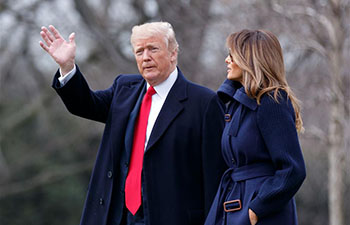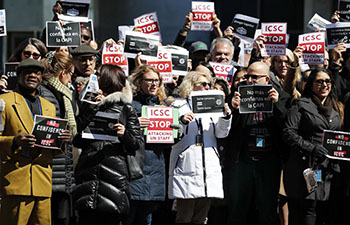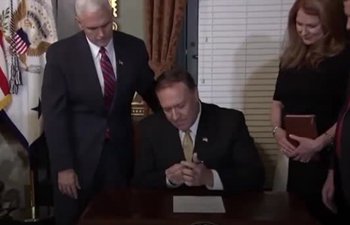by Matthew Rusling
WASHINGTON, March 19 (Xinhua) -- Despite the fanfare around the upcoming U.S. summit with the Democratic People's Republic of Korea (DPRK), some U.S. experts have minimal expectations for the event.
After much heightened rhetoric between U.S. President Donald Trump and top DPRK leader Kim Jong Un over Pyongyang's nuclear weapons program, the two sides have agreed to hold a one-on-one meeting in the coming months, as Washington is pressing Pyongyang to abandon its nuclear weapons program, and has turned up the heat on the regime.
"We should have minimal expectations for this initial summit between Kim Jong Un and President Trump," Troy Stangarone, senior director with the Washington-based Korea Economic Institute, told Xinhua.
Rather, the one-on-one meeting -- the first time a sitting U.S. president has ever met with one of the Kim family -- may start off small and there are no guarantees that promises will be kept, analysts said.
"An ideal outcome would be if the two leaders were to agree on a set of principles or a framework that could be fleshed out in working level discussions that the two leaders could later endorse. If they are successful in reaching an agreement on principals, I'd expect there to be a series of interlocking summit meetings between the players in the region and at least one more Trump-Kim summit before final agreement is reached," Stangarone said.
In an initial summit, Trump will press Kim to commit to denuclearization and attempt to use flattery to bring Kim around to his point of view, Stangarone said, adding that the United States will also likely push for limits on DPRK missile programs.
"If the summit is in Pyongyang, I would expect Kim Jong Un to put on a lavish military parade and perhaps a running of the mass games to appeal to President Trump and put him in as persuadable mood as possible," Stangarone said.
As for Kim, his objectives for any meeting will be multifaceted, he said.
He'll be looking to ensure that the process moves forward so as to minimize the pressure on the regime going forward, Stangarone added.
At the same time, he'll be looking to ensure that any framework leaves him with room to maneuver and create an environment to be able to maintain his nuclear program, he added.
The DPRK may be willing to release prisoners and compromise on some issues, but is not likely to stop its nuclear program or agree to meaningful inspections, Brookings Institution Senior Fellow Darrell West told Xinhua.
"Having the nuclear program has been part of the country's DNA for several decades and it seems unlikely they will sacrifice their major bargaining chip," West said.
Some analysts also ponder what may happen if Pyongyang ultimately fails to halt its nukes program, as Trump now has a hardline inner circle.
With Trump's recent sacking of several key administration officials, including former Secretary of State Rex Tillerson, experts are asking whether this will result in a more hawkish U.S. foreign policy.













